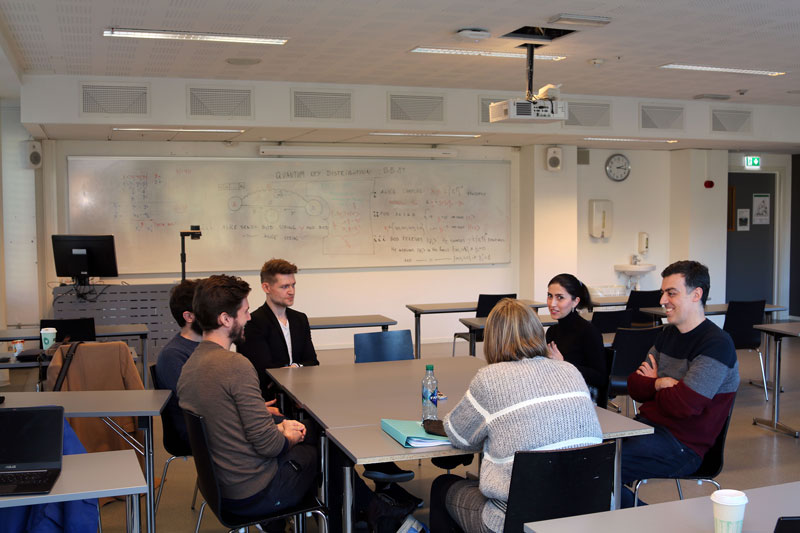by Berit Bungum (NTNU) and Sølve Selstø (OsloMet – Oslo Metropolitan University)
The fast-developing field of quantum computing has consequences for higher education in computer science, and initiates a new field for physics education research: What do future computer scientists need to know about quantum mechanics? The project Quantum Computing vs. Physics uses perspectives and methods from educational research and the philosophy of technology to identify a basis of knowledge and skills in quantum mechanics to be included in engineering study programs for computer science students without a background in physics.
With quantum computing being a fast-developing field, quantum mechanics is finding its way into computer science engineering education. While the more traditional areas of physics, such as mechanics, electromagnetism and thermodynamics, have an established role in engineering education, quantum mechanics does not. It has so far only been taught with a theoretical profile for physics students with a strong background in mathematics and classical physics in higher education. Quantum Computing vs. Physics aims to identify how, and to what extent, quantum mechanics should be represented in the education of computer scientists. This involves finding a balance between theoretical knowledge and applicable skills, in ways that contribute to productive technological development in quantum computing.
Technological knowledge is characterised as a pragmatic use of scientific knowledge, but also has its own basis of knowledge. In philosophy of technology, technological knowledge is described as spanning from knowledge of scientific concepts and principles via engineering theory to purely technical skills [1]. Engineering theory is a specific form of knowledge that may be based on scientific knowledge but reconstructed for practical use – the knowledge is generic but contains concepts more applicable in specific practical problems. It is of interest to identify the knowledge that constitutes engineering theory in the field of quantum mechanics for computer science students.
The research is an interdisciplinary collaboration between computer scientists and physicists at OsloMet – Oslo Metropolitan University, Department of Computer Science, and a physics education expert at the Norwegian University of Science and Technology (NTNU), Department of Physics. The master’s program entitled Applied Computer and Information Technology (ACIT) [L1] is used as a case in the research. The program features a specialisation within Mathematical Modelling and Scientific Computing, which, in turn, involves a course on quantum information technology.
Most students who enter this course do so with a background related to computer science. In general, their familiarity with physics is somewhat limited – in particular, when it comes to quantum physics. The course introduces students without any prior knowledge to quantum computing. The first few weeks are dedicated to introducing general concepts from quantum physics, such as the wave function, tunnelling, quantisation, spin and measurement. This is done predominantly by performing numerical implementations and discussing the observed results rather than through extensive lectures on theory. The part dedicated specifically to quantum computation and quantum programming, which constitutes the bulk of the course, also takes a practical approach.
The research is undertaken with educational reconstruction [2] as an analytical frame. This involves an analysis of the fundamental ideas and structures of the subject content, the significance of it for the learner, and identification of particular cases and phenomena that make the content relevant, interesting and accessible for the learner. In order to gain insights into how lecturers and students view the role of quantum mechanics in the course at OsloMet, a first round of data collection is being undertaken by means of group interviews with the lecturers and students in the course (see Figure 1).

Figure 1: Interviewing students about quantum physics as part of a course in quantum computing.
Preliminary results reveal ambiguous opinions among the lecturers in terms of how much quantum mechanics their students need to know. Students, on the other hand, express a fascination for the theoretical physics content of the course, but find the course challenging – some even describe it as being “scary” at the outset. Even if they agree on the relevance of the physics content, the students’ orientation seems to vary from “just follow the rules” to a deep motivation to understand the content with the aim of practical use. For example, one student expressed that “learning more about the physics behind makes it easier to swallow all these ideas that quantum computing is using to do calculations and all the algorithms we are looking at”. In summary, the interview data indicate that students appreciate the scientific content of the course and acknowledge its relevance. Future work will investigate how the quantum computing students benefit from the course content in quantum mechanics in their further studies.
Link:
[L1] https://www.oslomet.no/en/study/tkd/applied-computer-information-technology
References:
[1] J. M. Staudenmaier: “Technology's storytellers. Reweaving the human fabric”, Cambridge, Mass. and London: Society for the History of Technology and the M.I.T. Press, 1985
[2] R. Duit, et al.: “Teaching physics”, in N. G. Lederman & S. K. Abell (Eds.), Handbook of Research on Science Edu cation, Volume II (pp. 434-456), Routledge, 2014.
Please contact:
Berit Bungum
Department of Physics, The Norwegian University of Science and Technology, Norway











